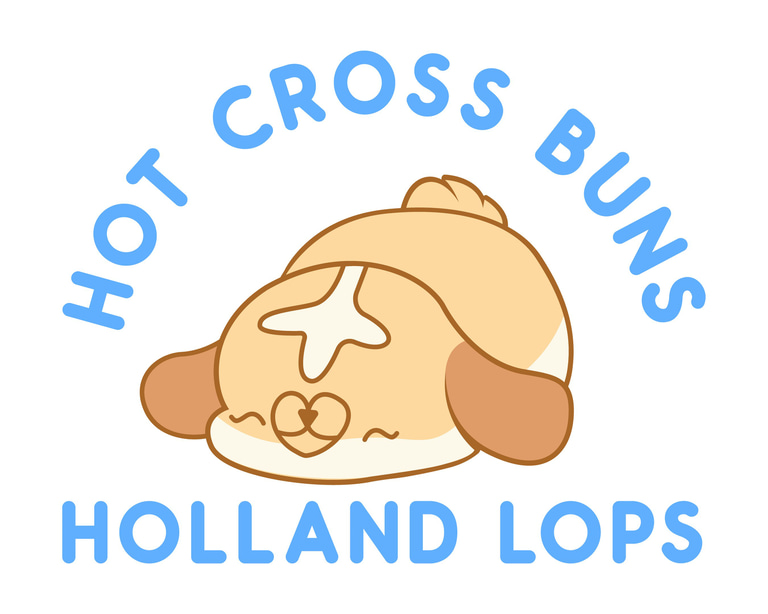Rabbit Treat Guidelines
Learn the best ways to introduce treats to your rabbit. From what type of treat to frequency and amounts, this guide can help prevent tummy upset and trips to the emergency vet.
Amy J - Big Bunny @ HCB
2/19/20244 min read


Hot Cross Buns follows the belief that treats (other than old-fashioned rolled oats) have no place in a rabbit’s diet until after he/she turns six months old. We prefer for their new families to have the joy (and responsibility) of determining which foods are the right treats for their Buns.
We recommend starting with the treats on the Green Light List. Work your way through it slowly to learn what your bunny likes, and what sits well in your bunny’s tummy. Give a small amount. Holland lops are small and shouldn’t weigh more than 3.5-5 lbs, so a little goes a long way. If you see any signs of abnormal or mushy poo balls in your bunny’s cage, stop feeding whatever treat was introduced most recently and cross it off the list, so you don’t give it to him/her again. Just give your bunny hay and water for a day or two until his/her tummy settles down and the poo balls are back to normal again.
There are some important things to remember about a bunny’s diet. Conventional wisdom says that 80% of the diet should be made up of hay and pellets, leaving 20% for foods that fall into the “treat” category. I tend to lean towards 90% hay and pellets, and only 10% treats. Another thing to remember: Too much sugar, calcium, and phosphorus are very bad for rabbits. The vast majority of foods on the Yellow Light List are high in at least one of these. Pick your Yellow Light List treats very carefully. Choose one fruit per week and one veggie/seed/herb per week to keep your bunny happy and healthy. Again, introduce only one treat at a time so you can see any negative reactions and adjust the list accordingly.
Occasionally you may find a treat that leaves your bunny with painful gas. Bunnies can’t burp or vomit, so whatever is hurting its tummy has to work its way through the entire digestive system. We strongly recommend that all bunny families keep a bottle or two of infant gas relief drops (a brand like Mylicon drops) to help settle bunny’s tummy. Give the bunny the dose recommended for smaller babies and gently massage your bunny’s tummy. Try to keep your bunny moving to help the gas work its way out. A bit of fresh parsley may help settle the tummy, too. If you ever have questions or concerns about your bunny’s health, please feel free to email us and we will do our best to help.
hcbhollands@gmail.com
If your bunny reacts badly to a food on the Yellow Light List, cross it off and add it to your Red Light List so you remember to not feed it to your Bun again.
Green Light Treats
The treats listed in this section are safe for bunny’s daily consumption. As always, when introducing a new treat, give a very small amount and observe the bunny for any gins of digestive distress (diarrhea, teeth grinding, acting “off”) for 24 hours before giving that treat to the bunny again.
Basil - any variety
Blueberries (fresh) - give only one or two berries per day
Bok Choy - for bunnies over six months only
Carrot tops
Celery and celery leaves
Cilantro
Dandelion leaves and flowers (if not chemically treated)
Lavender plant
Lemon balm
Oatmeal - rolled old-fashioned variety (raw, never cooked) - this is the only treat approved for baby rabbits
Oats (whole, unprocessed) - Rabbits over six months only
Oregano (fresh)
Parsley
Rocket
Rosemary (fresh)
Zucchini
Yellow Light Treats
The treats in this section are for very occasional giving only. Many fruits are bunny-safe, but they are high in sugars or oxalates, so need to be limited carefully. Choose only one of these treats to give on one special day each week. Watch for signs of tummy upset.
Apples (do not give bunny any seeds, which can be toxic)
Arugula
Asparagus
Bananas
Bean sprouts
Beets - greens, tops, and root
Bell peppers (green, yellow, red, orange, and purple are safe)
Blackberries
Broccoli Leaves are safe (never give bunny broccoli, which causes painful gas)
Cantaloupe
Carrots and carrot tops
Cherries (remove pit and give only one or two cherries)
Cherry tomato
Collard greens (tiny amounts only)
Crab apples (no seeds)
Cranberries
Cucumber (tiny amount as it has little nutritional value)
Eggplant
Grapes (no more than two at a time, washed and cut into small pieces)
Green beans (may cause painful gas, so observe carefully if you choose to feed)
Hostas (hosta plant)
Kale (tiny amounts to rabbits over six months only...high in calcium)
Kiwi (peeled)
Lettuce (dark green or purple varieties)
Mandarin
Mango (fresh)
Mint
Orange peels (better than oranges)
Orange (tiny amount)
Peach (remove pit)
Peppers (remove seeds carefully)
Pineapple (fresh only)
Plums (remove stone)
Pumpkin seeds (very rare treat)
Radish and radish leaves
Raisins (very rare)
Raspberry (fresh) and raspberry leaves
Romaine lettuce
Spinach (small amounts)
Squash
Strawberries
Sunflower seeds (high in fat, so go easy)
Tomato (do NOT give tomato plant leaves or vines to bunny...they are toxic)
Turnip and turnip greens
Watermelon and watermelon rind
Wheatgrass
Red Light Treats
The following treats should NEVER be given to your bunny, as they are toxic to rabbits or your bunny will be unable to digest them, causing him great pain and distress.
Almonds
Avocado - poisonous to rabbits
Banana peels
Bindweed - poisonous to rabbits
Bread
Broccoli
Brussel sprouts
Cabbage
Candy
Cauliflower
Cheese
Chocolate
Clover
Corn
Crackers
Dill weed and dill flowers
Garlic
Iceberg lettuce
Jicama
Meat
Mushrooms
Nuts - all varieties
Onions
Peanuts
Peanut Butter
Peas
Popcorn
Potatoes and Potato Skins
Sweet Potatoes
Tomato leaves/vines
Walnuts
White bread
